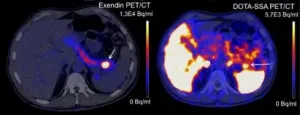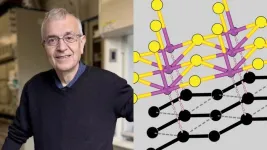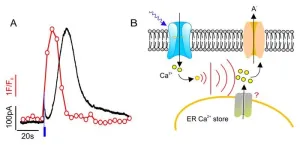(Press-News.org) HERSHEY, Pa. — Immunotherapies that mobilize a patient’s own immune system to fight cancer have become a treatment pillar. These therapies, including CAR T-cell therapy, have performed well in cancers like leukemias and lymphomas, but the results have been less promising in solid tumors.
A team led by researchers from the Penn State College of Medicine has re-engineered immune cells so that they can penetrate and kill solid tumors grown in the lab. They created a light-activated switch that controls protein function associated with cell structure and shape and incorporated it into natural killer cells, a type of immune cell that fights infections and tumors. When these cells are exposed to blue light, they morph and can then migrate into tumor spheroids — 3D tumors grown in the lab from either mouse or human cell lines — and kill tumor cells. This novel approach could improve cell-based immunotherapies, the researchers said.
The findings will publish this week on October 25 in the Proceedings of the National Academy of Sciences. The researchers also filed a provisional application to patent the technology described in the paper.
“This technology is totally out of the box. It’s akin to CAR T-cell therapy, but here, the guiding principle is the ability of cells to infiltrate the tumor,” said senior author Nikolay Dokholyan, G. Thomas Passananti Professor at the Penn State College of Medicine and professor of biochemistry and molecular biology. “I don't know of another approach that is anything close to this.”
CAR T-cell therapy was first approved by the Food and Drug Administration in 2017, and since then, it has demonstrated encouraging results for some cancers, particularly blood cancers. T-cells, a white blood cell in the immune system, are removed from a patient and re-engineered to produce a protein on their surface that binds to a specific target protein on cancer cells. When the CAR T-cells are infused back into the patient, they kill cancer cells with that target protein.
However, CAR T-cell therapy is less successful for treating solid tumors, which make up approximately 90% of adult human cancers and 40% of childhood cancers, Dokholyan said. Immune cells can’t infiltrate the dense network of proteins and other cells surrounding the tumor, and the hostile environment inhibits their tumor-fighting abilities. Plus, tremendous diversity among solid tumors makes it difficult to home in on a specific target protein to attack. To improve cell-based immunotherapies for solid tumors, Dokholyan said immune cells need to be able to bypass the solid tumor’s defenses.
Using computation modeling, the team designed and tested a light-controlled version of septin-7, an internal protein essential for maintaining a cell’s cytoskeleton — the structure that maintains cellular shape and organization. They inserted a light-sensitive domain into septin-7 to create what Dokholyan called “an allosteric regulator.” The light-sensitive portion of the protein is located far from the protein’s active site and doesn’t interfere with the structure and function of the protein until it’s triggered. The domain is activated by blue light, which switches the protein function on and off.
They then re-engineered human natural killer immune cells with the light-sensitive septin-7 protein. In the presence of blue light, the researchers observed that septin-7’s normal function was disrupted. The cells also exhibited a more elongated, spindle-like shape and greater protrusions extending outward, which help the cell interact with their environment and move from one location to another.
“Even though natural killer cells are small, around 10 micrometers, upon activation of this protein with blue light, the immune cells changed shape and can squeeze into tiny holes around three micrometers in size. That’s enough to infiltrate tumor spheroids and kill them from the inside,” Dokholyan said.
The researchers tested the re-engineered natural killer immune cells with two types of solid tumor spheroids, one created using human breast cancer cells and the other with human cervical cancer cells. Within seven days, they killed the tumor cells. In contrast, natural killer cells that hadn’t been re-engineered attacked the tumor spheroid from the outside but were unable to breach the tumor. Eventually, the tumor continued to grow. They also re-engineered immune cells from mice and tested them with tumor spheroids made from mouse melanoma cells.
While the results were robust, Dokholyan emphasized that this work is still in its preliminary stages and more research is needed to evaluate this technology for potential therapeutic use. He said he also hopes to explore other activation cues that could modulate protein function and cellular behavior.
Other Penn State authors on the paper include Todd Schell, professor of microbiology and immunology at the Penn State College of Medicine; Brianna Hnath, doctoral candidate in biomedical engineering; Congzhou Mike Sha, joint degree student in the MD/PhD Medical Scientist Training Program; and Lynne Beidler, research technologist. First author Jiaxing Chen was a doctoral candidate when the research was conducted and is currently a postdoctoral researcher at the University of Pennsylvania.
Funding from the National Institutes of Health and the Passan Foundation supported this work.
END
Re-engineered, blue light-activated immune cells penetrate and kill solid tumors
2024-10-21
ELSE PRESS RELEASES FROM THIS DATE:
Rapidly increasing industrial activities in the Arctic
2024-10-21
The Arctic is threatened by strong climate change: the average temperature has risen by about 3°C since 1979 – almost four times faster than the global average. The region around the North Pole is home to some of the world’s most fragile ecosystems, and has experienced low anthropogenic disturbance for decades. Warming has increased the accessibility of land in the Arctic, encouraging industrial and urban development. Understanding where and what kind of human activities take place is key to ensuring sustainable development in the region – for both people and the environment. Until now, a comprehensive assessment of this part of the world has ...
Scan based on lizard saliva detects rare tumor
2024-10-21
A new PET scan reliably detects benign tumors in the pancreas, according to research led by Radboud university medical center. Current scans often fail to detect these insulinomas, even though they cause symptoms due to low blood sugar levels. Once the tumor is found, surgery is possible.
The pancreas contains cells that produce insulin, known as beta cells. Insulin is a hormone that helps the body absorb sugar from the blood and store it in places like muscle cells. This regulates blood sugar levels. In rare cases, the beta cells malfunction, resulting in a benign tumor called ...
Rare fossils of extinct elephant document the earliest known instance of butchery in India
2024-10-21
During the late middle Pleistocene, between 300 and 400 thousand years ago, at least three ancient elephant relatives died near a river in the Kashmir Valley of South Asia. Not long after, they were covered in sediment and preserved along with 87 stone tools made by the ancestors of modern humans.
The remains of these elephants were first discovered in 2000 near the town of Pampore, but the identity of the fossils, cause of death and evidence of human intervention remained unknown until now.
A team ...
Argonne materials scientist Mercouri Kanatzidis wins award from American Chemical Society for Chemistry of Materials
2024-10-21
Mercouri Kanatzidis, a materials scientist at the U.S. Department of Energy’s Argonne National Laboratory and professor at Northwestern University, will receive the 2025 ACS Award in the Chemistry of Materials from the American Chemical Society, the nation’s leading professional organization of chemists.
The award “recognizes and encourages creative work in the chemistry of materials,” according to the citation.
At Argonne, Kanatzidis’s work has focused on the implications of a ...
Lehigh student awarded highly selective DOE grant to conduct research at DIII-D National Fusion Facility
2024-10-21
When it comes to sustainable energy, harnessing nuclear fusion is—for many—a holy grail of sorts. Unlike climate-warming fossil fuels, fusion offers a clean, nearly limitless source of energy by combining light atomic nuclei to form heavier ones, releasing vast amounts of energy in the process.
But it isn’t easy replicating and controlling the process that powers the sun.
“We eventually want to move to producing energy this way,” says Brian Leard ’21 ’25G, a ...
Plant guard cells can count environmental stimuli
2024-10-21
Plants control their water consumption via adjustable pores (stomata), which are formed from pairs of guard cells. They open their stomata when there is a sufficient water supply and enough light for carbon dioxide fixation through photosynthesis. In the dark and in the absence of water, however, they initiate the closing of the pores.
SLAC/SLAH-type anion channels in the guard cells are of central importance for the regulation of the stomata. This has been shown by the group of Professor Rainer Hedrich, biophysicist at Julius-Maximilians-Universität ...
UAMS researchers find ground beef packs bigger muscle-building punch than soy-based alternative
2024-10-21
When it comes to building muscle, not all proteins are created equal.
New research from the University of Arkansas for Medical Sciences (UAMS) reveals that 100% ground beef packs a bigger punch for muscle protein synthesis than a soy-based counterpart. In fact, the study suggests that a person would need double the amount of soy-based protein to achieve the same results.
Published in the American Journal of Clinical Nutrition, the study examined the anabolic response — how the body builds muscle — after consuming a 4-ounce beef patty versus one or two 4-ounce patties of a soy-based product. The results? Just one serving of beef did the ...
Study: AI could transform how hospitals produce quality reports
2024-10-21
A pilot study led by researchers at University of California San Diego School of Medicine found that advanced artificial intelligence (AI) could potentially lead to easier, faster and more efficient hospital quality reporting while retaining high accuracy, which could lead to enhanced health care delivery.
The study results, published in the October 21, 2024 online edition of the New England Journal of Medicine (NEJM) AI, found an AI system using large language models (LLMs) can accurately process hospital quality measures, ...
Four U-M faculty elected to National Academy of Medicine
2024-10-21
Four University of Michigan faculty have been elected to the National Academy of Medicine, one of the highest honors in medical research.
Kenneth M. Langa, M.D., Ph.D., Erica E. Marsh, M.D., MSCI, FACOG, Santa J. Ono, Ph.D. and Marc A. Zimmerman, Ph.D., are among 100 newly elected health and medical scientists recognized for their outstanding professional achievement and commitment to service.
They join the 79 other current, former and late U-M faculty who have earned this distinction. NAM members help the Congressionally chartered, private nonprofit organization provide objective advice to the nation on key health ...
FSU College of Medicine research team connects loneliness with heightened risk of dementia in largest study of its kind
2024-10-21
New research led by Florida State University College of Medicine faculty quantified the association between loneliness and dementia by analyzing data from more than 600,000 people around the world — the largest study of its kind.
The meta-analysis of 21 longitudinal studies showed that experiencing feelings of loneliness increased the risk of developing dementia by 31%. The research was published in Nature Mental Health.
“These results are not surprising, given the mounting evidence that link loneliness to poor health,” said Assistant Professor Martina Luchetti, who led the study. “Dementia ...






